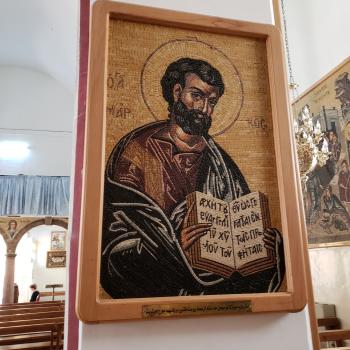BEN: On p. 390 you suggest that the phrase ‘from hearing with faith/faithfully’ actually means ‘from the message of faith’ and you cite 1 Thess. 2.13 and Rom. 10.16-17 as possible justification for such a translation. I must admit this really surprised me. First of all, this is an oral culture, in which the vast majority of folks only received the good news by hearing, and not just any kind of hearing but a believing hearing. I doubt that any of Paul’s audiences would have taken ek akons without further qualification to mean ‘from the message’. Notice there is no definite article in that phrase. This verse in Galatians can be contrasted with Rom. 10.16 which does indeed read ‘who has believed the message of ours’ with the article. But in that same two verses of Rom. 10.16-17 Paul does use the same phrase as here which surely ought to be translated ‘for faith comes from hearing, but ‘the message’ through what is said/the word of Christ.’ And 1 Thess. 2.13 seems equally clear that akons refers to what is heard, in this case a heard word. Notice the distinction here in 2.13 between the ‘logos’ and the act of hearing. Both the experience of hearing, and the message which is heard are involved in becoming a follower of Jesus. In short, while you agree that Paul is appealing to the Galatians’ own experience in Gal. 3.1-3 you seem to undermine what Paul is saying on that matter by the translation you suggest. It is not the message by itself that generates faith, it is hearing and believing the message surely.
JOHN: I don’t invest a lot in this, and as you say the phrase could be read another way. Romans 10.16-17, on your reading, has akoe used in two different senses (first the message; then hearing), and that is possible, though the chain of reasoning from Scriptural citation to Paul’s comment would then work by a play on words (or by Paul reading the word one way, then turning it another). I agree that Paul lived in an oral culture, where the oral telling of the good news was its primary medium. In fact, Gal 3.1 uses a visual rather than oral image, but the two are not far apart. I don’t think it wise to make much ride on this theologically, either way (either yours or Lou Martyn’s opposite reading). The message takes effect only if it is heard/received, but Paul would not want to congratulate anyone on hearing well or on believing: the whole point of this hearing/believing is that it recognises in Christ’s self-gift on the cross the only source and ground of our worth. It’s like hearing a will being read out: you have to hear it to recognize that you are a beneficiary, but the important thing is the person who left the money and gave you the inheritance.
BEN: I completely agree with your critique of the view of Dunn and others that what Paul is really fighting against is nationalistic imperialism, or merely the forcing of Gentiles to become Jews. This says too little. Paul is against the ongoing valuation of the Mosaic covenant and its law as norm or obligation for any Christian Jew or Gentile. This is why he says in Gal. 3.28 there is no Jew or Gentile in Christ. The community is established on the basis of faith in the Christ gift, and the community lives out that faith without reference to the keeping of the Mosaic covenant. Could you say a bit more about why the New Perspective gets it wrong when it suggests that Paul is merely exercised about imposing the Jewish boundary markers (circumcision, Sabbath keeping, food laws) on Gentiles? This seems to too narrowly limit the Pauline critique. Paul says he has died to the Mosaic Law, and clearly he sees that death as a good thing, for him and for others who were under the Law previously as well (or for that matter Gentiles who were enslaved to the elementary teachings they were once under).
JOHN: The new perspective rightly indicated that the differentials of ethnic worth, between Jew and Gentile, were central to the Galatian dispute, and that these differentials were most obviously manifested in certain kinds of Jewish distinctiveness (food in the Antioch dispute; circumcision at Jerusalem and in Galatia). But it wrongly considered that these were the only (or the primary) issues at stake, as if they could be peeled off from the rest of the Mosaic Law, which could continue to have validity without them. (In fact, this ‘new’ perspective is a kind of rehearsal of the reading of this matter in a very old perspective, advanced by Jerome, for instance.) But Paul does not and cannot distinguish them from the Law in its totality (see Gal 5.3), just as Jews in his day (e.g. Josephus) saw circumcision and food differentials as representative of the whole Jewish ‘constitution’ given by Moses, not detachable rites that one could discard while keeping the rest. Philo is hugely critical of Jews who think they could ‘spiritualize’ such things away (Migration of Abraham 89-93). The new perspective rightly saw the social implications of Paul’s critique of ‘works of the Law’, but wrongly understood his concern to be openness, inclusion, unity or equality. These were the side-effect of Paul’s good news, not his primary focus, which was to think through, and practise, what a community looks like that takes its bearings entirely from the good news itself. This implies that the Torah as a whole is dethroned, as Gal 2.19 indicates (‘I have died to the Law’) together with all Paul says about being no longer under the Law (3.23-25; 5.18 etc.). Paul does not demonize the Mosaic Law, but he does relativize it (it had its era, but it was not as early as the promise and its authority does not outlast the arrival of Christ). That is theologically hard to take if you are wedded to the idea that the Mosaic Law is indistinguishable from God’s eternal will. Dunn makes much of the overlap between the life of the Spirit and the content of the Mosaic law that Paul notes in Gal 5.14, but what lies beneath his concern here is a wider theological configuration of the relationship between God, creation, history, and law, which, as he indicates, owes much to the Reformed tradition. Paul’s position is theologically daring and dangerous – clearly too dangerous for some!
BEN: You rightly make much of Paul’s theology of the cross, and its implications for the re-ordering of the social world of God’s people. What is it about Christ’s death, do you think, that leads Paul to such a fundamental transvaluation of all values, including a leaving behind of the previous measuring rod in his life— the Mosaic Law, as a means of defining who is in right relationship with God and who is not?
JOHN: At least three things about the cross are fundamental to Paul in this context. First, to take pride in a death, a death which one shares in baptism, is to declare the end of one’s former existence, and to affirm that one’s only hope is that God can and will bring life out of this hopeless dead-end (see Gal 6.13-15). In other words, identification with Christ-crucified resets the clock to 00:00 hours: and life starts again in a new mode not determined by anything that held sway in the life before. Secondly, crucifixion itself is such a terrible, debilitating and humiliating form of death, reserved for those most despised, that to find here the focus of God’s saving work in the world is to challenge at their core the standard evaluations of power, wisdom and honour (see 1 Corinthians 1-2). And Galatians 3.13 might suggest a still sharper point: to believe in Christ cruified is to believe in someone who came under the curse of the Law: either the Law is right, and he is permanently cursed, or God’s overturning of this curse in the resurrection indicates that the Law’s jurisdiction has come to an end.
BEN: Some long time ago, I wrote an article for NTS entitled Gal. 3.28– Rite and Rights for Women. In it I argued that what Paul is saying is that the old pecking orders, and stratifying factors in society that places some in superior and some in inferior statuses, no longer count nor should they be implemented in Christ. Paul is of course not saying that men cease to be men or that Jews cease to be Jews, but he is saying that these things are not determinants on either who’s in and who’s out, or of the status and roles of those in the community. There is also a strong suggestion that the group identity of being ‘one’ in Christ is primary, and all other nested identities are secondary and must be normed by the primary thing—namely the Christ gift. Unpack for us a bit what you think the implications are of Gal. 3.27-28. I grow weary of hearing from some fellow Evangelicals ‘well all it means is that we are all equal in the sight of God and equally saved if we are Christians, but it doesn’t have any social implications’!!!!
JOHN: I agree with you that what is being claimed there is not that the previous labels are somehow wiped out (one does not cease to be a Jew, or a non-Jew), but that they are no longer salient: they no longer matter in the core question of identity and with regard to one’s pattern of life in the primary locus of one’s relationships, with fellow believers. They are no longer what counts for worth, positive or negative; such classifications no longer detemine the value-system of the commmunity in Christ, and are therefore no longer endowed with hierarchical assumptions. This means there is a new rule of life in the community (not just a new means of entry into it). It would make no sense to Paul to say, ‘there is no Jew and Greek, but of course Greeks are inferior members of the community and have to become as much like Jews as possible’; he is furious when this is what Peter says or implies at Antioch. Would it make sense to him to say, ‘there is no slave or free, but of course no slave could possibly take a leadership role in the church’? He is not calling here for the abolition of slavery, but he is saying that the life of the church should pay no regard to these differentials in social or legal status: the people who take leadership, for instance, are simply defined as the more ‘spiritual’ (Gal 6.1), and they could well be slaves! Paul’s gospel is about forming new communities who evidence that they are saved by an unconditioned grace, without regard to previous definitions of worth. precisely by disregarding the former hierarchical orders in their communal life. If the gospel does not create social change in the life of the church, it does not count as good news. My whole reading of Galatians is intended to bring this out.
BEN: I’m glad you discussed Paul’s ‘asthenia’ experience as recorded in Gal. 4. I wonder if we can’t do a little detective work, a la Holmes, and put a few things together. I begin with the premise that the statement ‘you would have plucked out your eyes and given them to me’ cannot be a random remark. Paul’s affliction was visible, and likely involved his eyes, which was especially problematic because of the ancient evil eye conventions. What kind of seer or visionary could Paul be if he had eye trouble? And so Paul is especially grateful they didn’t think he was casting an evil eye on them, and did not feel the need to spit. Quite the contrary, they received him as if he were Christ himself or angel.
Now if we start with what is said in Gal. 4, it is possible that we can put a few things together, some more, some less probable: 1) Paul’s Damascus road experience involved his being blinded for a time. Perhaps, he never fully recovered all his sight, or had ongoing eye troubles; 2) clearly he had some kind of chronic issue, that caused the Corinthians to complain about his ethos being weak, his physical presence being off-putting; 3) this might explain the need from time to time for the attentions of a physician, perhaps this is why Luke sometimes traveled with him, and why in the end the Pastorals mention Luke the physician alone being there with Paul in Rome; 4) Paul is clearly literate, he can both read and write, but he regularly uses scribes? Why? Is there a clue when he says ‘see with what large letters I form my name, this is the way I do it in my correspondence (authenticating that it is from him). What kind of person needs a large print edition and writes with large letters? Answer— a person with eye troubles. And finally 5) Paul recounts a visionary experience he had some years previous. He says he was caught up into the third heaven and heard unutterable things. Notice he doesn’t say he SAW anything. Now this should have struck us as odd. Visionaries always tell what they saw in a vision. Not Paul. While some of these points are stronger than others, the cumulative effect of them suggests to me that we need to think of Paul as an unhealed healer, and a visionary with eye-troubles. Is this part of the stigmata he mentions— probably not since that seems to refer to the result of persecutions for the faith. Still…. The above presents a different image of Paul that humanizes him. What do you think of this hypothesis?
JOHN: Well, as you say, there are quite a few hypothetical steps along this path, and some look to me stronger than others (for instance, I think the ‘large letters’ are more about emphasis than they are about his ability to see). The strongest point would be the remark about digging out their own eyes and giving them to him (Gal 4.15), though many think this may be a metaphorical expression for ‘you would have done anything at all for me’, and does not indicate that they literally wanted to give him their superior eyesight. (When we say, ‘I would have given him my right arm’ it does not mean that the person I felt so much for was literally one-armed!). What Paul finds remarkable is that they did not treat his disability, whatever it was, with contempt, unlike the Corinthians who said his bodly presence was weak and despised him for it (2 Cor 10.10). (By the way, I think Paul’s theology of weakness provides a very useful resource for a Christian theology of disability.) So, I am intrigued by how you join up the dots, but the combination of sources, and the uncertain readings of several of those texts, leaves me rather wary, I fear.

















